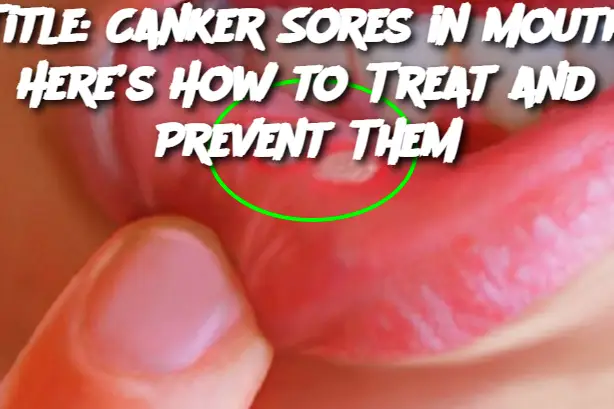-
Salt Water Rinse:
- Instructions: Dissolve 1 teaspoon of salt in 1 cup of warm water. Swish the solution around your mouth for about 30 seconds before spitting it out. Repeat 2-3 times a day.
- Why It Works: Salt water helps reduce swelling, cleans the sore area, and promotes healing by drawing out fluids and bacteria.
-
Baking Soda Rinse:
- Instructions: Mix 1 teaspoon of baking soda with half a cup of water to make a soothing mouth rinse. Swish it in your mouth for 30 seconds before spitting it out. Use this rinse 2-3 times a day.
- Why It Works: Baking soda neutralizes the acids that may irritate the sore, balancing the pH level in the mouth and easing discomfort.
-
Aloe Vera Gel:
- Instructions: Apply a small amount of fresh aloe vera gel directly onto the canker sore using a clean finger or cotton swab. Leave it on for a few minutes before swallowing or rinsing. You can repeat this process 2-3 times a day.
- Why It Works: Aloe vera has anti-inflammatory and healing properties that can help reduce pain, redness, and swelling associated with canker sores.
-
Honey Application:
- Instructions: Dab a small amount of honey directly onto the canker sore and let it sit for a few minutes. Honey’s natural antibacterial properties help prevent infection and aid in the healing process. Repeat 2-3 times daily.
- Why It Works: Honey is known to provide a protective layer over the sore, reducing irritation and promoting faster healing due to its anti-inflammatory properties.
-
Coconut Oil:
- Instructions: Swish 1 tablespoon of coconut oil in your mouth for 10-15 minutes, allowing it to coat the sore. You can also apply it directly to the affected area. Repeat 2-3 times daily.
- Why It Works: Coconut oil has antimicrobial properties that help prevent infection, while its soothing nature helps reduce inflammation and pain.
-
Chamomile Tea:
- Instructions: Brew a cup of chamomile tea and let it cool to room temperature. Use the cooled tea as a mouth rinse or apply a chamomile tea bag directly to the sore for a few minutes. Repeat 2-3 times a day.
- Why It Works: Chamomile has anti-inflammatory and healing properties that can help reduce irritation and promote healing.
-
Over-the-counter Pain Relief:
- Instructions: Use a topical numbing gel or cream containing benzocaine, or a corticosteroid ointment like hydrocortisone. Apply directly to the sore, following package instructions.
- Why It Works: These products help numb the pain and reduce inflammation, providing temporary relief while the sore heals.
Serving and Storage Tips:
- Consistency: Apply your chosen remedy consistently for best results. Typically, a canker sore will heal within 7-10 days, but regular application can reduce pain and speed up recovery.
- Avoid Irritating Foods: While healing, avoid spicy, acidic, or rough-textured foods that may aggravate the sore.
- Stay Hydrated: Drink plenty of water to keep your mouth hydrated, which helps with healing and reduces further irritation.
Variants:
- Probiotic-Rich Foods: Eating foods like yogurt or kefir can support your gut health, which in turn may reduce the frequency of canker sores. Probiotics help balance the oral microbiome and can help manage the underlying causes.
- Vitamin Supplements: Deficiencies in certain vitamins, particularly vitamin B12 and folate, may contribute to canker sores. Consider taking a vitamin supplement if you’re deficient, after consulting with your doctor.
FAQ:
Q: Can I prevent canker sores from happening? A: While it’s difficult to prevent them completely, you can reduce the frequency of canker sores by avoiding triggers such as stress, certain foods (e.g., citrus, spicy foods), and physical injury to the mouth (like biting your cheek or brushing too hard).
Q: How long does it take for canker sores to heal? A: Most canker sores heal within 7-10 days, but remedies like saltwater rinses or aloe vera can help speed up the healing process and reduce discomfort.
Q: Should I see a doctor if I get frequent canker sores? A: If you experience canker sores more than 3-4 times a year or if they are unusually large, persistent, or painful, it’s a good idea to consult a healthcare provider. It could be a sign of an underlying condition that needs attention, such as an immune system disorder or a vitamin deficiency.
Q: Can stress cause canker sores? A: Yes, stress is a common trigger for canker sores. It can weaken your immune system, making you more susceptible to developing sores in your mouth. Stress management techniques like meditation, deep breathing, and exercise can help reduce the occurrence of canker sores.
Q: Can I use salt directly on the sore instead of in a rinse? A: While salt can help dry out the sore, applying it directly can cause additional irritation. A saltwater rinse is a gentler and more effective method of reducing inflammation and soothing the area.
Conclusion:
Canker sores can be a frustrating and painful condition, but with the right care and treatment, you can speed up healing and alleviate discomfort. By incorporating natural remedies such as saltwater rinses, aloe vera, honey, and coconut oil, you can effectively treat canker sores at home. Additionally, by making lifestyle changes, avoiding known triggers, and managing stress, you can prevent future outbreaks. Whether you’re experiencing your first canker sore or dealing with frequent occurrences, these remedies will help you find relief and keep your mouth feeling better.
